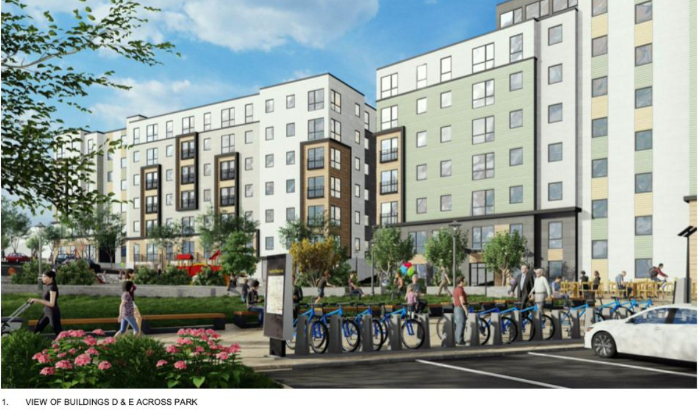City gives final approval for expansion, renovation of public housing
Clarendon Hill, a 216-unit housing development in West Somerville, will be substantially enlarged, redesigned, and renovated, after the City Council last week authorized $14 million in borrowing to help finance the project.
Located at 34 North St. between Alewife Brook Parkway, Powder House Blvd., and Broadway, Clarendon Hill currently contains 216 one, two, and three-bedroom apartments. The redevelopment project will replace this configuration with 295 market-rate units and 296 affordable units.
The development team is a public-private partnership between two nonprofits—Preservation of Affordable Housing and Somerville Community Corporation—and real estate investment and development firm Gate Residential, whose parent holding company is Redgate Holdings, LLC, based in Boston.
According to a statement from SCC: “The Clarendon Hill redevelopment project will transform the existing 1940s public housing development into an ethnically, linguistically, and economically diverse neighborhood that reconnects a physically isolated site with the surrounding neighborhood and incorporates community open space and a wide variety of amenities at a time when Somerville market rents are becoming unattainable for many families.”
Last Thursday, June 9, the City Council authorized a total of $14 million to renovate Clarendon Hill. Of that $14 million, $4 million was appropriated from Community Preservation Act funds, which the city is allowed to use for the construction of affordable housing, historic preservation, and/or open space. The CPA funds will help pay for 80 new affordable units. The additional $10 million from the city will go to infrastructure and building site work.
At last week’s City Council meeting, a summary of the project’s history and current status was provided by George Proakis, Executive Director of the Mayor’s Office of Strategic Planning and Community Development.
“I think it is reasonably safe to say that this is the most physically distressed public housing that we have in the city, just in terms of the condition of units, condition of buildings. The site layout is particularly unfortunate, it doesn’t have a lot of green space, the units are not well designed,” Proakis said.
The new project will include a mix of high-rise buildings and townhouses, with a new community green space at the center of the site. To improve safety at the development, which is surrounded by three busy roads, designers worked to create better access to the adjacent supermarket, the nearby Mystic River Reservation, and the rest of the neighborhood. They also plan to modernize utility connections, with a focus on long-term sustainability.
“There has been a lot of involvement, both from abutting residents and the community. There has not been a lot of opposition to this project in the community,” Proakis said.
All residents of the existing 216 affordable housing units will have the right to return to Clarendon Hill when the project is complete, with the same affordable rent. Eighty new permanently affordable units will be created, and the for-profit developer will build 295 market-rate units.
The original 1940s development was funded through state programs, although it’s owned by the Somerville Housing Authority. When it came time for renovations, the state encouraged the city to partner with a private developer.
Gate Residential, the developer that won the contract, “is a substantial part of the finances that make the public housing and the affordable housing possible,” Proakis explained to the City Council last week. “So they build the market-rate units. They provide some funding to … the nonprofits doing the other buildings. That funding, plus the state funding, plus what we’re putting in today, is what makes this project as a whole work.”
The Somerville Housing Authority first called for proposals in 2016. The Community Preservation Committee approved its $4 million contribution in 2017, and the City Council approved its plan in 2018, which was required to go to the State Legislature as a home rule petition.
The state approved a version of that home rule petition, but included a modification requiring prevailing wage, which is a minimum hourly wage rate set by the state, “for the entire project, including the private side of the project,” Proakis explained. He said the increased labor costs that resulted “did create some pressures on the overall development financing.” More recently, inflation has added to that “pressure,” he said.
Although the vote to approve the municipal funding was unanimous, several city councilors expressed misgivings about certain aspects of the project.
“I’ll be honest,” Councilor at Large Jake Wilson said. “I really hate these situations where really noble causes end up in conflict. It forces progressives into a real Sophie’s Choice. Here we have affordable housing and labor at loggerheads. … I’m left frustrated that we couldn’t figure out a way to get this done with union labor. We hear our city is a union city. I’m sorry, but our track record says otherwise.”
City Council President Matt McLaughlin spoke about larger concerns about the development of public housing.
“While it’s positive that we’re finally getting people homes that they deserve, this is really the privatization of affordable housing, of public housing, in my mind,” he said.
“There was a time in American history that was not that long ago, when the government would not worry about funding affordable housing. There was a time, when this housing was built and when other housing was built, we built 100 percent affordable housing, 100 percent prevailing wage, and it just wouldn’t be an issue. And we’ve entered this era of austerity where we now basically rely on private developers and have to appeal to their financial interest to make something like this happen. So it’s an unfortunate turn of events in America in general, and across the world, but that’s not what we’re here to talk about right now.”
McLaughlin also said he had voted against the project before, “and I got a lot of heat for that,” but many of the features he had objected to were actually fixed in the final plans for the project.
“It is time to get building,” he concluded. “This should have been done already. Happy to support it right now, and I would like to move on.”
Councilor Judy Pineda Neufeld, who represents Ward 7, where Clarendon Hill is located, said she and the residents are very excited to see the project move forward.
“When I talk to residents about what they’re most excited about, the list is long. Things like the green space. A community room to meet in, finally. Housing that’s well maintained,” she said.
“Some of these families are the most vulnerable in our city, struggling with food insecurity, wage theft, language access issues,” Pineda Neufeld said. “On behalf of those tenants, they’ve been waiting long enough for safe housing, affordable housing, well-maintained housing.”
Phase one of construction is expected to begin this fall.
Image of the new Clarendon Hill development courtesy of the City of Somerville.
This article is syndicated by the Somerville Wire municipal news service of the Somerville News Garden project of the Boston Institute for Nonprofit Journalism.
All Somerville Wire articles may be republished by community news outlets free of charge with permission and by larger commercial news outlets for a fee. Republication requests and all other inquiries should be directed to somervillewire@binjonline.org. Somerville Wire articles are also syndicated by BINJ’s MassWire state news service at masswire.news.
SUBSCRIBE TO THE SOMERVILLE WIRE EMAIL NEWSLETTER: https://eepurl.com/hpBYPv
Check out all our social media here: https://linktr.ee/SomervilleWire.
Linda Pinkow is a reporter for the Somerville Wire. She is also a development consultant for the Boston Institute for Nonprofit Journalism.











